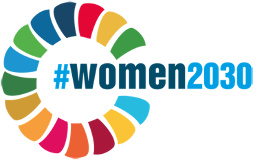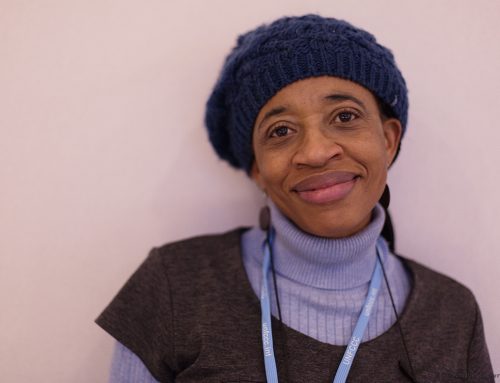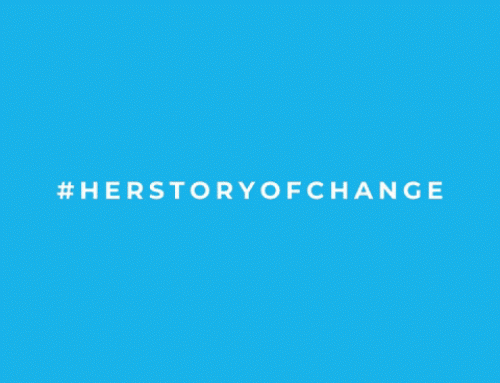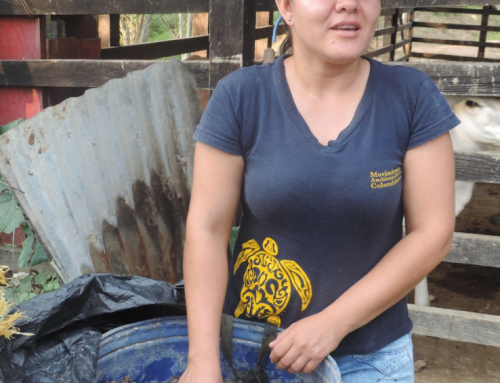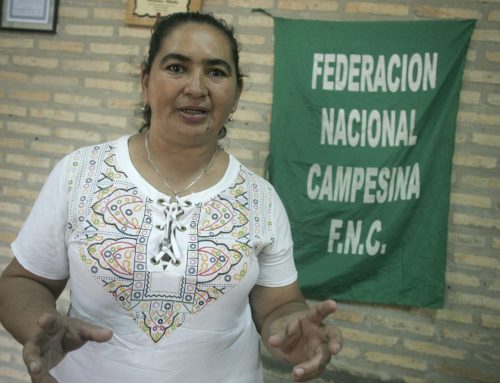- Location: Sarikhasor, Tajikistan
- Works for: Forester for the Tajikistan State Agency
- Role in #women2030: Trainer of trainers
- Related SDGs: SDG 3, SDG 5, SDG 8, SDG 15
My name is Safarbi Davlatova and I work as a forester and collaborate with the Civil Society Organisation NOOSFERA. I participated in trainings on the Women2030 project in Tajikistan and I now work with women from local mountain communities. I am close to Sarikhasor in the community of Mulokoni. I am from a rural area myself and I love our mountains and nature. I like the greatness of the mountains, the pure springs and our beautiful legends about the richness of nature. My parents have always tried to protect nature, and I have always dreamed of doing work that protects nature too, so I became a forester. It is very rare for a woman to get a position such as mine, and I am the only woman in our team of foresters. We have a lot of fruit and nut forests in Sarikhasor and the adjacent mountain areas. The population has increased over the past few years and this has caused conflicts among the local population. Women especially suffer from a lack of equal rights to access natural forest resources. I am sure that if you persistently prove your right to work and your right to resources, you can achieve a lot. Therefore, I often advise our women members and help them to talk to their superiors.
In past trainings I learned to understand the SDGs and in seminars we often discussed how these global goals relate to us, our problems and achievements. Now I share this knowledge with the women in the community. At our meetings, women talk and argue a lot. They talk about their own development and about their hopes for a steady, comfortable life in the mountains. I understand the problems that women share with me very well and together we are ready to do something useful. It gets dark early in the winter and some families still live without proper electricity to light the houses. Some settlements here in the mountains do not have a spring and women and children have to go down to the river to get water. They carry water all day long to keep their families alive.
All of this has made me interact with women and work with community organisations to look for opportunities and knowledge to develop real solutions for women. When we get together, we are very determined to make a difference as well as to empower other women. We also formed a youth group where we introduced them to issues such as gender equality. We hold seminars and round tables for them, we have mentoring from NGOs and we are waiting for grants for more local initiatives. We are engaged in awareness-raising with the youth and our community as a whole.
Today, I believe very much that it is possible to achieve gender equality. Gender equality is not just our right, but also an important condition for a more prosperous, sustainable and peaceful Tajikistan, and world as a whole.
Safarbi Davlatova
- Ubicación: Sarikhasor, Tayikistán
- Trabaja en: Guardabosques de la Agencia Estatal de Tayikistán
- Función en #women2030: Formadora de formadores
- ODS relacionados: ODS 3, ODS 5, ODS 8, ODS 15
Mi nombre es Safarbi Davlatova, trabajo como guardabosques y colaboro con NOOSFERA, una organización de la sociedad civil. Participé en las capacitaciones del programa Women2030 en Tayikistán y ahora trabajo con mujeres de comunidades locales en las montañas. Estoy establecida cerca de Sarikhasor, en la comunidad de Mulokoni, en una zona rural y amo nuestras montañas y la naturaleza. Me gusta la grandeza de las montañas, los manantiales puros y las bonitas leyendas de mi gente que hablan sobre la riqueza de la naturaleza. Mis padres siempre han tratado de proteger la naturaleza, y yo siempre he soñado con hacerlo también y por eso me convertí en guardabosques. Es muy raro que una mujer obtenga una posición como la mía, y de hecho soy la única mujer en el equipo de guardabosques. Hay muchos bosques frutales en Sarikhasor y en las zonas montañosas adyacentes pero la población ha aumentado en los últimos años y esto ha provocado una gran cantidad conflictos en las áreas forestales, incluidas las áreas de arboles frutales y nogales.
Son sobre todo las mujeres las que sufren la falta de acceso equitativo a los recursos naturales del bosque. Estoy segura de que, si se persevera en la lucha por los derechos a trabajar y a los recursos, se pueden conseguir muchas cosas. Por ello, a menudo aconsejo a nuestras mujeres y las ayudo para que hablen con sus jefes.
Durante los talleres de capacitación, aprendí sobre los ODS y en los seminarios discutimos cómo estos objetivos globales están relacionados con nosotros, nuestros problemas y logros. Ahora comparto este conocimiento con nuestras mujeres en la comunidad. En nuestras reuniones, las mujeres hablan y debaten mucho. Hablan sobre su propio desarrollo y sus expectativas de poder tener una vida cómoda y estable en las montañas. Entiendo muy bien los problemas que las mujeres comparten conmigo y estamos listas para hacer algo y tratar de solucionar estos problemas. En invierno, oscurece temprano y algunas familias aún viven sin la electricidad adecuada para iluminar las casas. Algunos asentamientos en las montañas no tienen manantiales y las mujeres y los niños tienen que caminar hasta el rio para conseguir agua. Tienen que hacer esto a lo largo de todo el día para que sus familias puedan vivir.
Todo esto me llevo a interactuar con mujeres y trabajar con organizaciones comunitarias para desarrollar soluciones para nuestras mujeres. Estamos muy decididas para hacer algo y cambiar las cosas. También se ha creado un grupo de jóvenes donde les hablamos sobre temas como la igualdad de género. Tenemos seminarios y mesas redondas con ellos y con gente de ONG, y estamos esperando recibir subvenciones para apoyar iniciativas locales. Estamos comprometidas para aumentar la concienciación entre los jóvenes y de toda nuestra comunidad en general.
Hoy en día entiendo que es posible lograr la igualdad de género. La igualdad de género no es solo nuestro derecho, sino también una condición importante para tener una sociedad más próspera, sostenible y pacífica en Tayikistán, y en todo el mundo.

